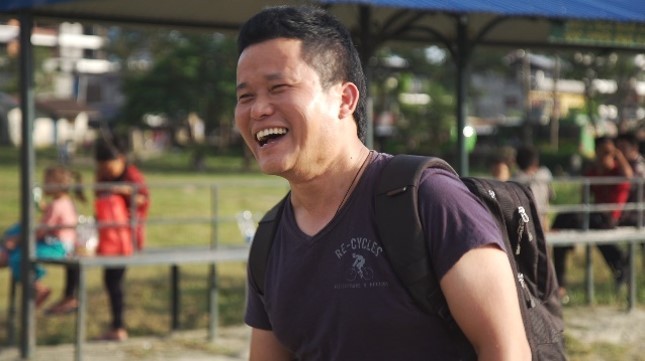‘Free, Minu’ pays tribute to migrant who fought for foreign workers’ rights
By Choi Ji-wonPublished : May 12, 2020 - 17:39

Director Jee Hye-won of “Free, Minu” had not intended the film to hold the last words of Nepalese singer and activist Minod Moktan -- better known by his Korean name Minu -- when she began working on the film in 2016 with the intention to raise the issue of migrant workers in Korea.
The documentary that follows Minu from 2016 to 2018 premiered at the 10th DMZ International Documentary Film Festival in 2018. While Minu was banned from reentering South Korea for 10 years after a 2009 expulsion for being undocumented here, he was issued a special three-day permit to attend the film fest. A month after he returned home, Minu died from a heart attack in October the same year. He was 47 years old.
“Free, Minu,” slated to open in local theaters on May 27, is a reedited version following Minu’s death.
“If the original had focused more on how Minu, who had spent his golden age in Korea, was living in Nepal, the edited version following Minu’s death sheds new light on the position and role played in the migrant workers’ community in Korea,” director Jee said on Monday at the press screening of the film in Seoul.
During his 18-year stay in Korea, Minu fought for the rights of foreign laborers as a singer of multicultural band Stop Crackdown and as the head of Migrant World Television. While he took up many jobs considered lowly by Koreans since arriving in the country in 1992, Minu did not doubt he was part of Korean society. That is, until he was forcefully deported in 2009.

Jee, who became Minu’s close friend while making the film, said Minu was a person “who constantly looked back on his life and was skeptical about his life.“
“Minu was kicked out of Korea, his work unrecognized not yielding meaningful results. He consistently asked ‘was my life worthless?’ He was hurt when he was deported. In Nepal, Minu tried all he could to practice the values he had learned in Korea,” Jee said.
However, Minu’s laughter rings throughout the film. Minu requested that she not make a film that takes pity on his life, Jee explained. Although Korea had refused Minu’s reentry, he referred to the country as his “home” until the last moments of his life.
“Unlike other social issues, migrant workers issues require both the public’s heart and mind be moved. There are too many acts of hatred and discrimination arising from ignorance, so people need to understand (about the migrant workers) first. Even if we gain knowledge, we instinctively feel uncomfortable about unfamiliar beings. The key is to constantly try to eliminate that feeling, and I believed Minu was a person who can easily break down the wall (against immigrants) inside our hearts,” Jee said.
Jee is a 25-year veteran documentary producer who has spent most of her career producing television documentaries for major broadcast networks. She debuted as a film director in 2018 with “Singing with Angry Bird,” a film about a children’s choir in a slum in India. “Free, Minu” is her second documentary film.
By Choi Ji-won (jwc@heraldcorp.com)












![[Today’s K-pop] BTS pop-up event to come to Seoul](http://res.heraldm.com/phpwas/restmb_idxmake.php?idx=644&simg=/content/image/2024/04/17/20240417050734_0.jpg&u=)





![[KH Explains] Hyundai's full hybrid edge to pay off amid slow transition to pure EVs](http://res.heraldm.com/phpwas/restmb_idxmake.php?idx=652&simg=/content/image/2024/04/18/20240418050645_0.jpg&u=20240418181020)

![[Today’s K-pop] Zico drops snippet of collaboration with Jennie](http://res.heraldm.com/phpwas/restmb_idxmake.php?idx=642&simg=/content/image/2024/04/18/20240418050702_0.jpg&u=)